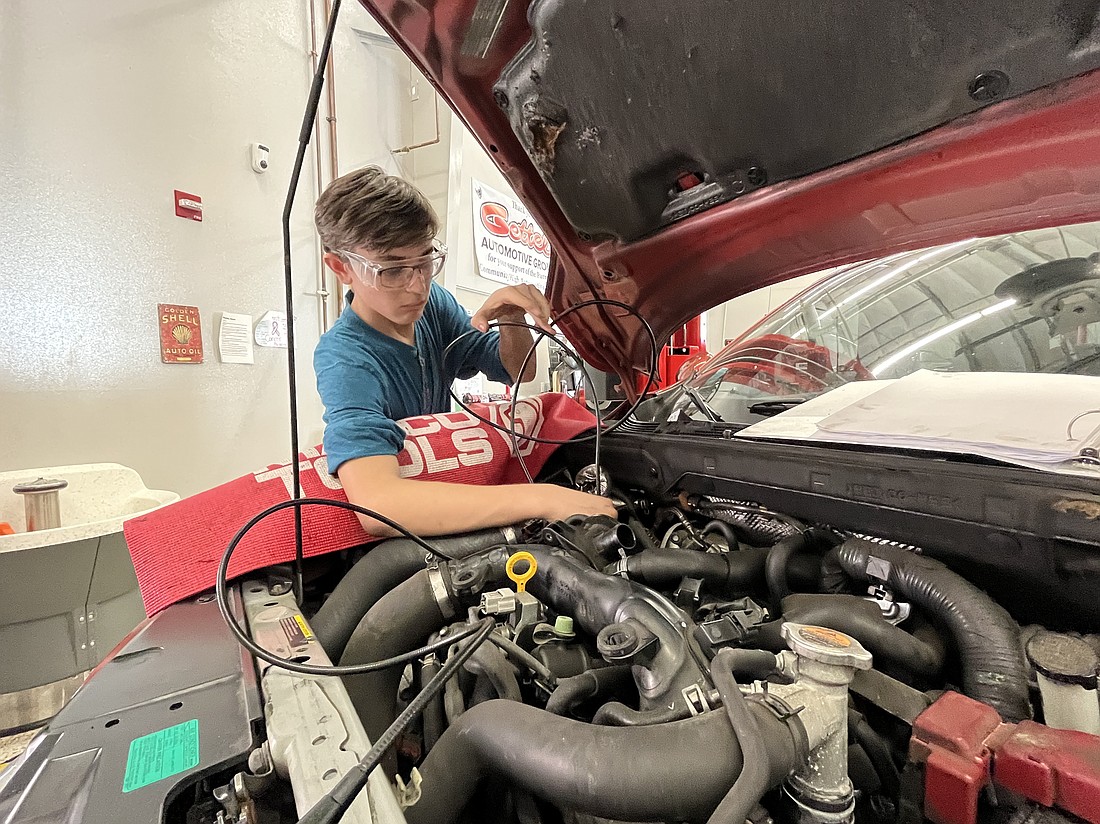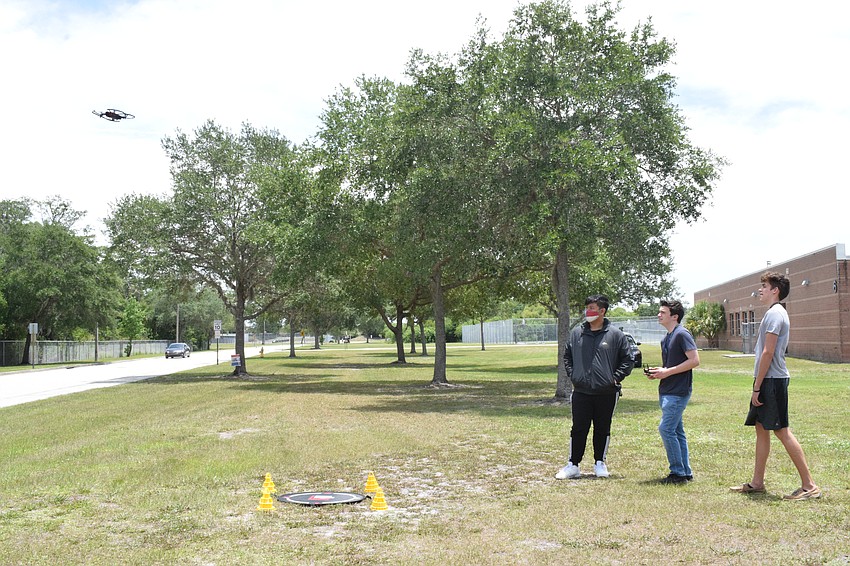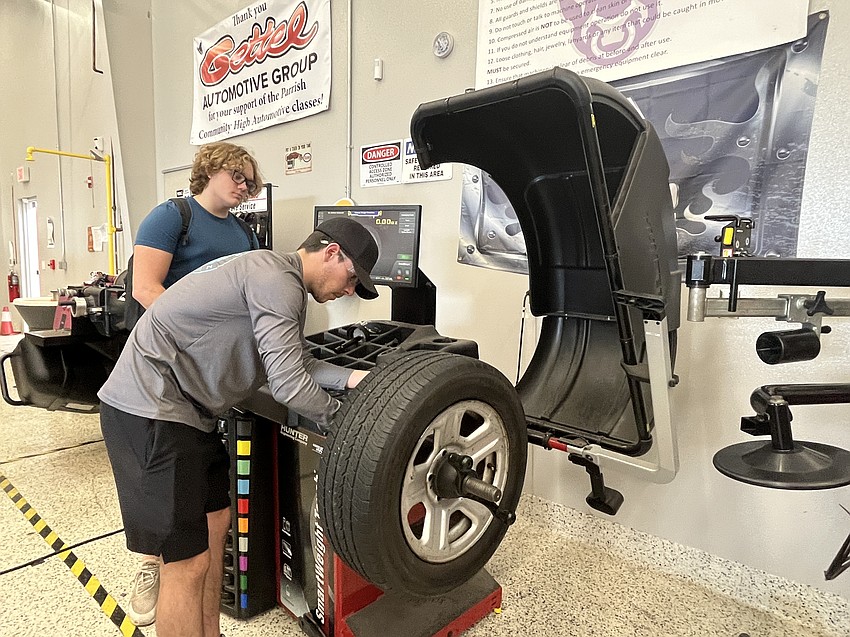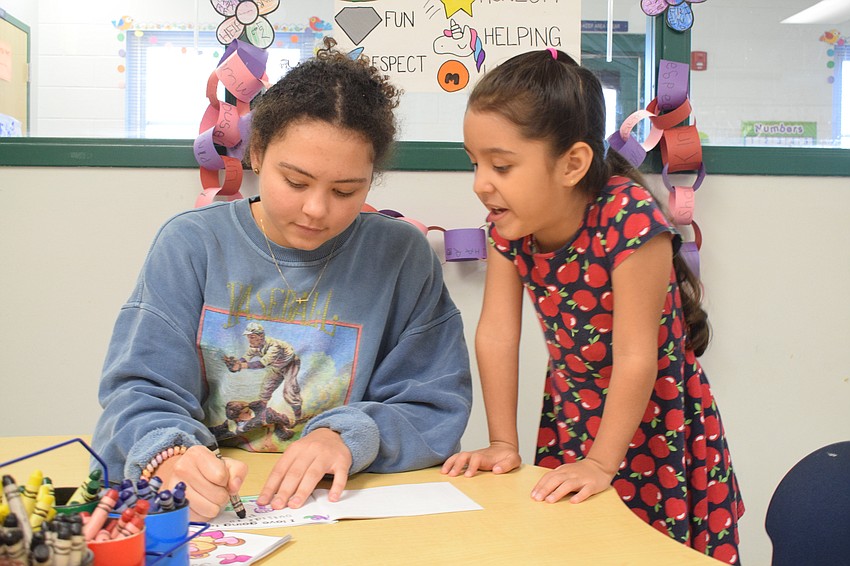- April 4, 2025
-
-
Loading

Loading

At the same time Tyler Carrell, a senior at Parrish Community High School, is turning a wrench on a car in the school’s automotive technology program, Lakewood Ranch High School sophomore Abbie Becher is teaching Jack Wright, a child in the school's Mini Mustangs program.
Another School District of Manatee County student might be learning agriscience in a barn while still another is operating a drone in front of his or her school.
Today's learning environment has taken many forms, as students prepare for very different futures through the district's career and technical education programs.
Many of these programs are quite different that what might have been expected from a school district only a decade ago.
Gone are the days of students learning how to sew in a home economics class or a student learning to make a birdhouse in woodshop.
However, the district has recognized the need for career and technical education is constantly changing and it is trying to meet those needs.

Paul Gansemer, the executive director of adult, career and technical education for the district, said career and technical education started as a focus on agriculture, and family and consumer science, but times have changed.
“Back in the early 1900s, it was about growing food, taking care of the farm, taking care of the house and the children,” he said. “As you move forward, different programs were developed based on the needs of the community, which was mostly through technology.”
Classes like woodshop turned into manufacturing. Rather than learning how to use a hammer and nails, students are using 3D printers, lasers and robots.
A computer class would have taught typing decades ago, but now students are learning to type in elementary school. Computer classes in high school are focused on cybersecurity, web design and computer gaming and simulation.
The district has worked with businesses and industry leaders in the community to find what is needed, and then it develops courses to address those needs.
“A lot of it is based on the needs of the community and the state that allows us to offer those courses and classes,” Gansemer said. “It’s extremely important to have opportunities for students to learn the skills to be able to go into a career field of their choice. If they’re able to get that at the high school level, it gives them the opportunity to get into the work field earlier and earn a wage to support their family. Our community can be strong and vibrant based on the training of our students.”
The district tries to provide the same equipment that’s used in the industry in the classroom so students already know how to use it if they land a job.
Businesses and organizations in the community are supporting the district’s efforts to develop skilled students they can eventually employ.
The Gettel Automotive Group donated $25,000 to Parrish Community High School’s automotive maintenance and light repair program. With the donation, Sherman Ballard, the program’s teacher, said the program can upgrade its technology, and he can buy basic supplies for his students.
“We’re looking at technology that changes every day, especially in the automotive fields,” Ballard said. “You have to stay on top of it.”
Ballard said more focus will be placed on electric cars in the automotive industry now with hybrid vehicles. His program will continue to teach students how to diagnose and repair a standard vehicle, but he hopes to expand to teach more about hybrid vehicles so students can get a leg up.
Carrell wanted to be in the automotive program after watching all the “Fast and Furious” movies. Seeing Paul Walker, who plays Brian O’Conner in the movies, build a Supra from the ground up was inspiration for Carrell to learn more about the automotive industry.
When he walked into the shop for the first time three years ago, he had no clue what he was doing.
“It was exciting but also very overwhelming because everything was so new to me,” Carrell said. “I didn’t know what a tire machine was or what brakes did, or power steering.”

The Parrish Community High senior said the automotive program has been “life changing.” He started high school wanting to become a veterinarian, but after being in the automotive program, he sees himself going into the mechanical field. His dream job is in aeronautical mechanics, working on planes for a living.
“This way I’ll have money so I can go play with cars, and I want to work on something a little bigger than vehicles,” he said.
Career and technical education has become integrated into middle school education as well, so students can start their education in a certain field in middle school and continue on through high school. For example, students can begin to learn about robotics at a higher level in middle school before moving onto advanced robotics skills in high school.
“If you think about manufacturing, our society has changed to where technology is doing many of the tasks of assembly or creating,” Gansemer said. “A lot of it is dealt with by the use of robotics. A lot of the teaching we do with robotics is helping students understand coding and how to manipulate a robot so if they get a job within manufacturing, they’re ready.”
Whether students choose to go to college, a technical school or the workforce, Gansemer said students are prepared for their future post-graduation.
Many students are able to take tests to earn certifications that make them career-ready once they graduate.
“Last year, a couple of my students actually got hired in full-time, pretty good-paying jobs,” Ballard said. “I’m really proud of them, to see their enthusiasm when they know they can either work on their own cars or their parents’ car, or anything like that. They can properly diagnose it and repair it. Some of the students come in and say, ‘Hey, you should have seen what I did over the weekend.’ They’re all excited about how they can actually do this.”
Not all career and technical education courses are about technology. Some teach students about art, agriculture or early childhood education.
Lakewood Ranch High School has the only early childhood education course in the school district. The school has its Mini Mustangs program where children will come on campus, and high school students will serve as teachers as part of the early childhood education class.

Delaney Riggins, the early childhood education teacher, said the class and Mini Mustangs gives her students hands-on experience in teaching before they graduate.
They are tasked with creating and following lesson plans and working with the children. Their junior year, students will go off-campus to an early childhood education site such as a preschool or elementary school to get real-world experience. Riggins said by the time they graduate, they are ready to earn a certification that allows them to work in an early childhood education setting, so students could be going to college and working part-time, giving them more experience.
“I love watching (the students) grow over the years,” Riggins said. “It’s amazing to see them start as freshmen who are shy and apprehensive and grow so much as teachers and people.”